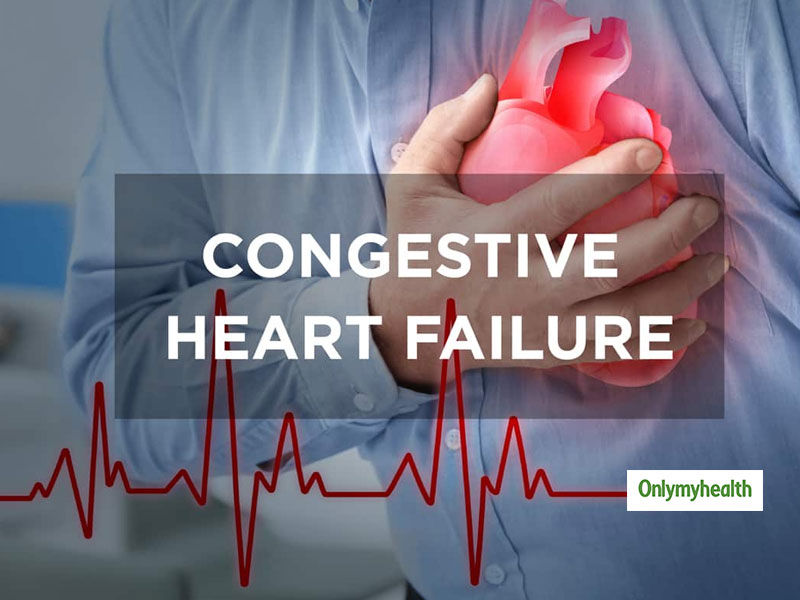
The heart is a muscle that consistently squeezes and relaxes with each heartbeat to pump blood around the body. Typically, a healthy heart is strong, muscular and is a bit larger than the fist, in size. Heart Failure leads to a gradual weakening of heart muscles due to lack of enough blood pumped. Here’s all you need to know about the Congestive Heart Failure, Symptoms, Warning Signs And Prevention. Dr Sundeep Mishra, Professor of Cardiology, AIIMS, New Delhi explains it all.
Table of Content:-

Type of Heart Failure is based on a measurement called ejection fraction. In this, Heart Failure with reduced ejection fraction (HFrEF) happens when the left side of your heart doesn’t push blood out to the body as it should. There are two type of Heart Failure - Chronic heart failure where there is a long-term ongoing problem and Acute heart failure, where symptoms suddenly appear, and they might even go away. It can also affect either side of the heart or both sides. Heart attack and heart failure are two different diseases - a heart attack is a sudden event which occurs when one of the heart’s blood vessels becomes blocked, unlike Heart Failure which is the weakness of heart muscle.
Also Read: Here's What Cardiologist Dr Sundeep Mishra From AIIMS Has To Say About Cardiac Care During COVID-19
Symptoms Of Congestive Heart Failure
While Heart Failure, also known as Congestive Heart Failure (CHF) is a progressive disease, it can be managed if diagnosis and treatment are instituted promptly. Therefore, it is essential to pay close attention to the signs and symptoms of Heart Failure.
Some common symptoms of Heart Failure that shouldn’t be confused with signs of old age or any other disease are:
Shortness of breath: Heart Failure patients experience shortness of breath, due to fluid retention in the lungs
Shortness of breath while performing activites: Lying flat on the back can cause severe shortness of breath and therefore, patients generally have to use multiple pillows for breathing properly
Swelling in the ankles, legs and abdomen: Fluid build-up might cause swelling in the ankles, legs and abdomen
Constant tiredness and fatigue: Fatigue is one of the most common problems associated with Heart Failure because when the heart is unable to pump blood properly, the body becomes devoid of oxygen and experiences fatigue
Loss of appetite: Swelling in and around the gut, can affect digestion and cause loss of appetite
Frequency of urination: Due to Heart Failure, a reduced amount of blood reaches the kidney which reduces the frequency of urination

Warning Signs Of Congestive Heart Failure
Several warning signs may foretell about impending Heart Failure or worsening of heart failure.
- Sudden weight gain (~ 1 kg/day or ~ 2 kg in one week)
- Extra swelling in the feet or ankles.
- Swelling or pain in the abdomen
- Shortness of breath even when not exercising
- Difficulty in breathing even when lying flat
- Waking up with shortness of breath
Tips To Prevent Congestive Heart Failure?
The only way to prevent Heart Failure are by managing the various risk factors/signs such as High blood pressure, Coronary artery disease, Heart attack, Diabetes etc. Now to manage these risk factors, it becomes imperative to follow a balanced and healthy diet. Here are a few tips on how to maintain a healthy lifestyle:
Reduce salt intake
Eating less salt is critical to managing the symptoms of Heart Failure. The sodium present in salt, causes water retention in the body, worsening the fluid build-up associated with Heart Failure. When the body has more fluids, it becomes harder for the heart to pump correctly.
Stop smoking and alcohol abuse
Alcohol and smoking can cause severe damage to your heart. Every cigarette you smoke worsens Heart Failure. Study says, roughly 1 out of 5 deaths from heart diseases is directly related to smoking. Similarly, alcohol consumption leads to high blood pressure. Hence, Heart Failure patients are strictly advised to quit smoking and limit alcohol consumption.
Regular exercises or walking
It is imperative to do 20 – 30 minutes of light physical activity as a part of your daily routine. Brisk walking or running strengthens the heart muscle and helps regulate the blood flow. However, since this disease happens in older age and highly intensive workouts are not allowed. They are asked to do light exercises with Doctor’s recommendation
Follow a high fibre diet
Heart Failure patients need to take good care of your health by including more veggies, reducing salt intake and limiting a lot of water consumption along with avoiding any type of sodas

Also Read: Heart Disease And Young Adults: Know The Possible Triggers And Prevention Tips
Take good care of mental health
Stress can be one of the significant risk factors. Hypertension/extreme stress puts an additional burden on the weakened heart muscle. The patient needs to avoid anxiety; caregivers need to take care they don’t go in depression while patients can do yoga/meditation for managing stress.
Though it is advised, to connect with your respective cardiologist before doing any lifestyle modification
With inputs from Dr Sundeep Mishra, Professor of Cardiology, AIIMS, New Delhi
Read more articles on Heart Health
How we keep this article up to date:
We work with experts and keep a close eye on the latest in health and wellness. Whenever there is a new research or helpful information, we update our articles with accurate and useful advice.
Current Version